College events and job fairs offer new opportunities to students. During these events, they can connect with top industry professionals, meet new people, and broaden their network. This experience can be frightening and overwhelming, so our experts have outlined several tips to help you make the most of these opportunities. This article prepares students for such occasions, explains how to deal with potential contacts, and gives advice about what steps to take after networking events.
The strategies that you will find on this page will help develop practical communication skills, pursue career growth, and search for employment opportunities. Our article will be helpful for students who wish to build a solid network of contacts during their college years. In turn, their efforts will increase their chances of success in their professions.
🤝 The Importance of Networking for Students
If you are a student, you have likely heard about the importance of networking many times. Professors, career advisors, peers, and maybe even your parents all sing the same tune – networking is an essential skill. It is no secret that knowing many different people opens up new and unexpected possibilities.
However, this is not the only benefit of networking. Let’s discuss all its advantages and why attending college events and career fairs is essential. First, let’s talk about what networking is.
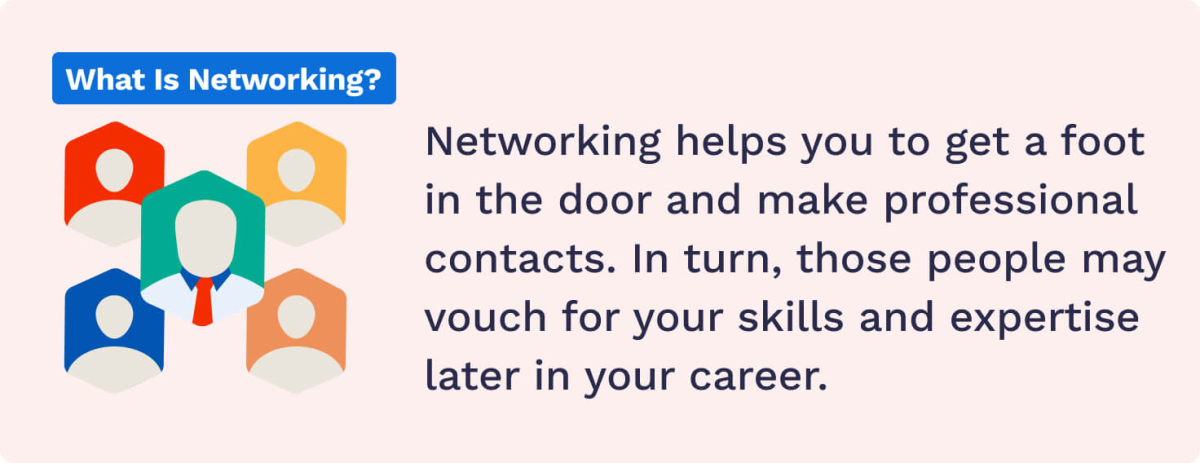
In a nutshell, networking refers to face-to-face conversations in a professional or semi-professional environment. These interactions build the foundation of relationships with potential employers and peers.
There are several advantages to this practice:
📚 Pre-Event Preparation
Now that you know about the benefits of professional networking, you might be interested in attending such events. For some, this will seem like a chance to spend several hours in the presence of interesting people. But, for many others, the idea of attending job fairs can be stressful and even intimidating. Whichever way you may be feeling, it is essential to thoroughly prepare for networking events to make your best impression. First, let’s get the myths and facts straight:
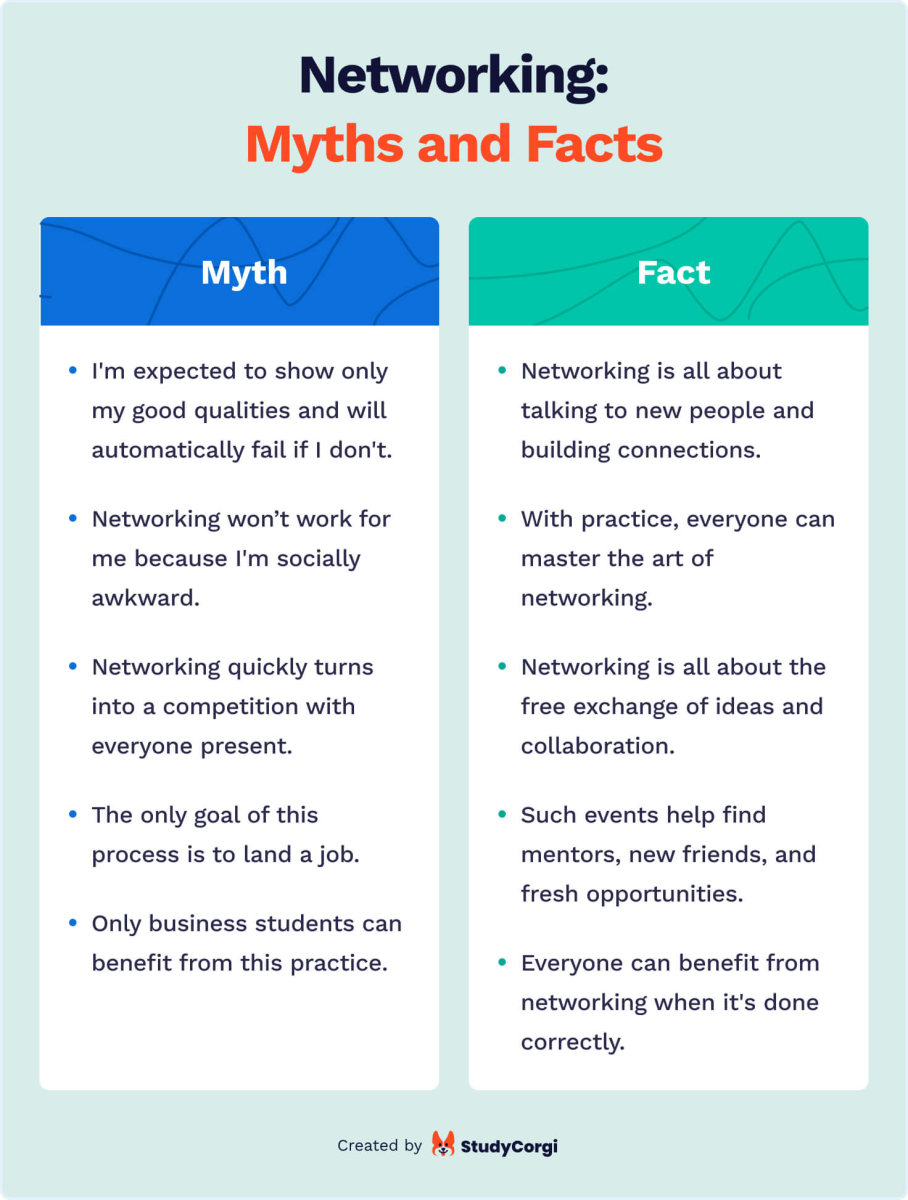
There are several things you can do to better prepare yourself for a networking event:
- Describe what you want to gain from the event.
Walking around aimlessly and waiting for opportunities to come your way is a losing strategy. Write down your goals before and during the event. Maybe there are certain people you wish to meet and with whom you want to discuss certain things. - Research those you wish to talk to.
Carefully research the attendants and speakers you want to approach. You’ll find the most common information on their LinkedIn profiles and in Google search results. Know how these people can benefit you in the long run. - Contact them before the event.
There’s no need to wait until the last minute to reach out. Write personal emails to other attendants and express your desire to meet them. You may signal that you’ll be present at the occasion through the use of hashtags on social media platforms. - Dress to impress.
To make a favourable impression on everyone who is present, you must decide what you’ll wear several days in advance. The choice depends on the form of attire (casual or formal). Remember that your first impression is crucial, so take the time to research the best outfits for a networking event. - Standardize contact information.
You’ll receive information from firms during a job fair or a networking event. The problem is that many of them may have different forms: from leaflets to business cards. Track this information with a smartphone or a notebook, and you’ll spend less time sorting it out afterward. - Prepare to talk about yourself.
Other attendants will want to learn something about you as well. Take time to consider the path you wish to pursue, your interests, and your dreams. This way, the sharing of information won’t be one-sided.
🗺 Navigating the Event
In her book The Secrets of Savvy Networking, the American author Susan RoAne wrote the phrase “It’s not what you know or who you know, but who knows you.” We believe that during college events, this advice is indispensable for any student.
At a first glance, meeting many people and collecting numerous business cards seems very important. In fact, many students use this approach at such events. However, the truth is that if you pay attention to quality over the quantity of communication, you can take advantage of it in a better way. In this part of the article, we’ll tell you how to get out of your routine and be remembered by potential employers. You should consider three aspects: communication, body language, and questions to ask.
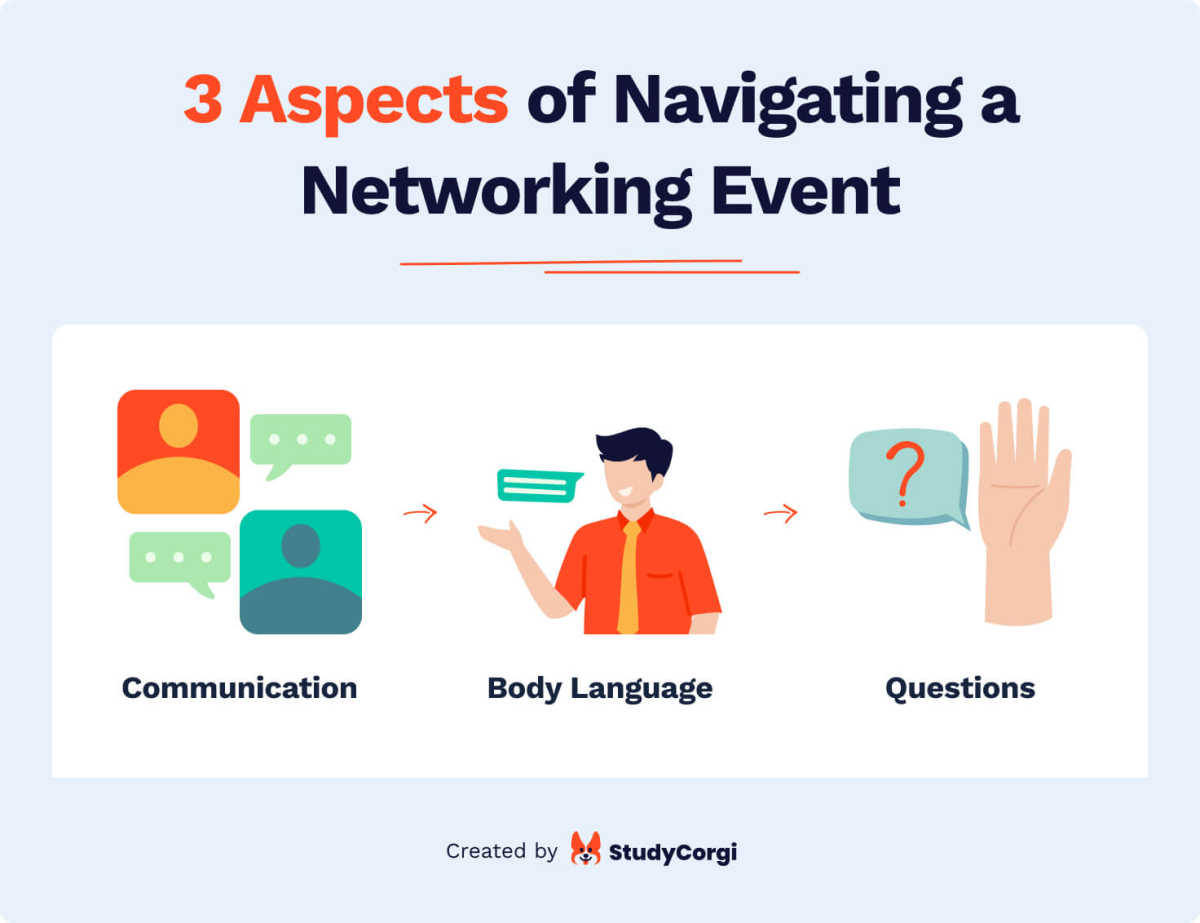
Communication
The most important part of communication is having the right approach to people. After all, a networking event is all about building meaningful relationships with people. You’ll only have one chance to make an excellent first impression – but don’t worry! With our advice, we’re confident you’ll effortlessly become the star of any event.
Get ready in advance, set goals, and be specific
To begin with, you should decide what you expect from the event. Set your aims – for example, finding three potential employers or being around people from different organizations to make valuable connections. Your goals should be reasonable and achievable, and you shouldn’t spread yourself too thin. Familiarize yourself with the invitation list to prepare for introductions and present a successful and promising image.
Remember that networking events are just yet another social setting. Be polite, kind, and genuine, and you will no doubt make a good impression on your conversation partners.
Be friendly and confident, and don’t be afraid to make acquaintances
Think about how you can cultivate the conversation because simple compliments or admiration won’t lead to a long discussion. Be polite and remain calm because you’ll be meeting your potential colleagues. Feel free to participate in a debate or start a conversation if you notice the right person. Even if it’s the event’s organizer, making an acquaintance will open up new prospects for future meetings.
Ask the right questions
Often at these events, people try to get to know each other and tell others as much about themselves as possible. However, to stand out and be remembered, we advise you to also ask questions about work or inquire about the career path of the person you are talking to. At the same time, you’ll want to strike up a memorable conversation that is sincere and deep. Hence, we recommend making a list of possible questions. If you have no idea where to start, you can read a list of our suggestions below.
Practice active listening and taking notes
One effective way to show that you’re paying attention is to demonstrate your understanding. You can do this by paraphrasing someone else after a meaningful or challenging statement. This way, you can demonstrate your involvement in the conversation. This is one of the fundamental techniques for establishing working contacts for future productive relationships.
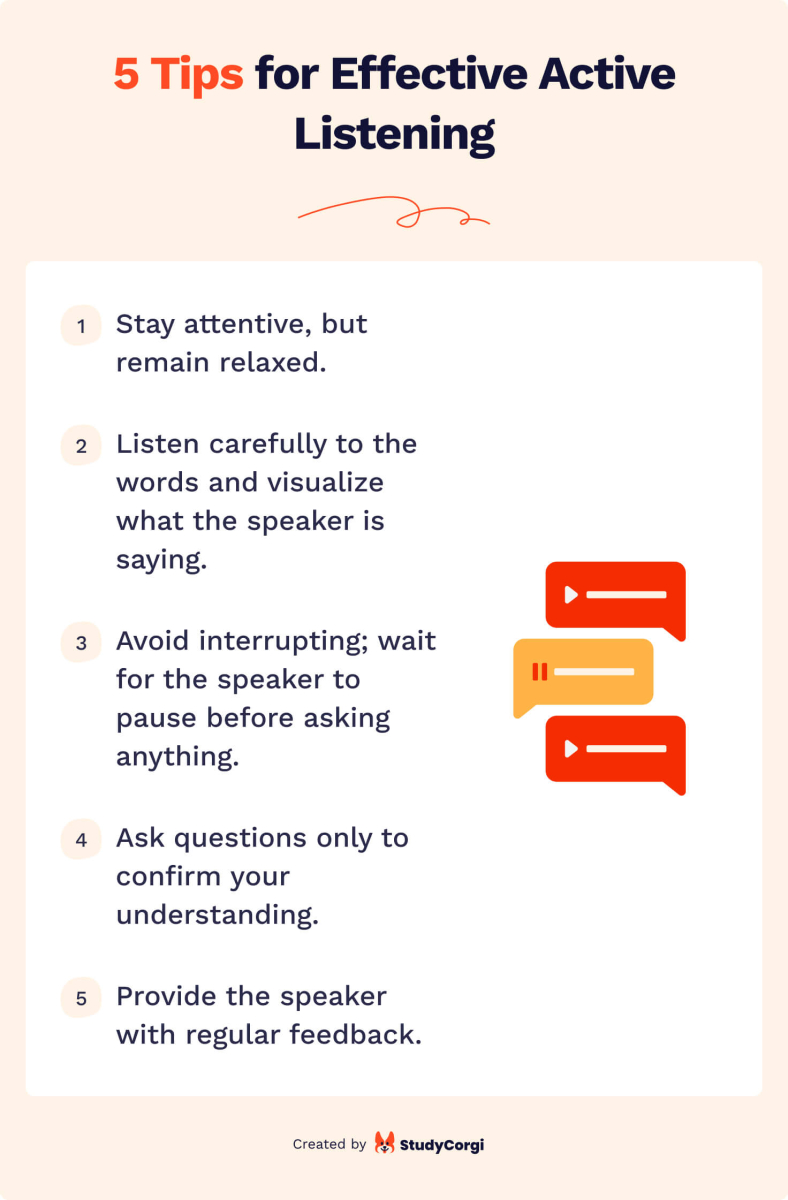
We also advise you to take notes after each encounter. After all, the emotional rush of the moment can cause you to forget even the most crucial information. However, if you take quick notes in shorthand at the critical points, you’ll be able to demonstrate your professionalism and the value you place on the conversation.
End the conversation politely and keep in touch with new contacts
The quality of conversations should be significant, as most interactions are quickly forgotten. You can hint at an interest in further communication at the end of your talk. For example, ask to be kept informed about the progress of a promising company project. After exchanging contacts, you can find these people on LinkedIn and continue communicating there. You could even invite them to a business lunch or a meeting.
Body Language
Body language is also essential during networking events. Your facial expressions, the position of your hands, and even the way you stand can tell a lot about you. We are not suggesting that you always have be in total control of your body or face. After all, the most important thing when making new connections is to be yourself and have fun. Nevertheless, it’s good to remember the tips we’ve outlined below before your event. Perhaps take the time to practice in front of the mirror to ensure your body language looks open, friendly, and professional.
Keep a physical distance and make eye contact
If you have scanned the crowd and found the people that you’d like to talk to, don’t hesitate to approach them. You should remember people’s boundaries and use a comfortable social distance to start the conversation. As a rule, this is a distance of one to three meters, or roughly six feet. This way, you won’t be intruding on anyone’s personal space.
Eye contact also plays a role in the process of initiating conversation. Modern technologies have made it difficult for some people to maintain eye contact but it is usually encouraged in a professional environment. However, remember that there are some cultural sensitivities in which prolonged eye contact would be inappropriate or offensive.
Smile and practice mirroring
It’s no secret that a smile is a perfect tool for putting a person in a good mood. With a smile, you can show your readiness to make contact, and your interlocutor can reciprocate your feelings. The practice of mirroring gestures and the facial expressions of your conversation partner works in the same way.
Unconsciously copying your interlocutor’s body language will make a person feel at ease when they communicate with you. All your non-verbal signals will make people feel comfortable around you, and your conversation will be more friendly, natural, and relaxed.
Choose an appropriate type of handshake
The moment of introduction is vital because this is the first impression you will make on the person. And one of the most important non-verbal greeting gestures is a handshake. This may surprise you, but there are actually quite a few ways to shake hands! We recommend you learn more about them and practice them, because your handshake can show your self-confidence.
If you want to make a good impression with your handshake, here are some tips to keep in mind:
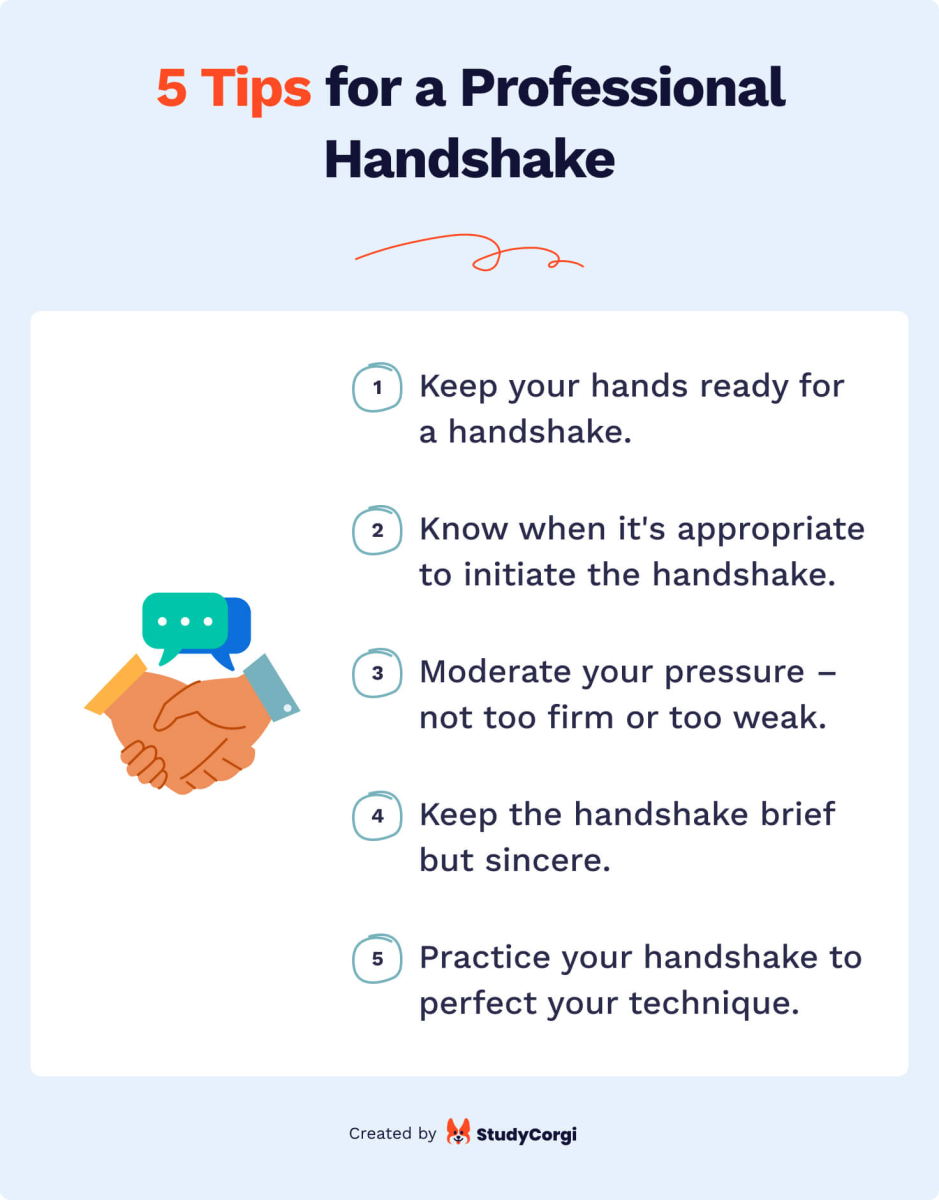
Watch your hand movements
The position of your hands is worth mentioning because it can nonverbally attract or repel another person. For example, if you fold your hands on your chest, you signal your unwillingness to continue the conversation. It also serves as an indicator of secrecy or disinterestedness.
If you don’t know where to put your hands, the best advice is to keep them within sight. There is no need to hide them in your pockets. You can put your hands by your sides, but don’t ball them into a fist. Instead, leave them relaxed to show your openness and trust.
Watch your foot position and your walking gait
Your gait can also tell a lot about you. Keep your posture, and walk confidently with regular steps. If you rush or walk quickly, you’ll give the impression of a disorganized person with no leadership qualities.
When you reach the person you want to talk to, keep your feet straight, don’t cross them. Also, try to ensure that the toe of your shoes always faces the person you are talking to. This is a sign of your engagement and attentiveness to the conversation.
Questions to Ask
Knowledge of suitable ways to communicate and the appropriate body language are vital to ensure that you come across as memorable during a networking event. Once you’re sure that people will remember you, it’ll be much easier to follow up with them in the future. However, remember that these events should also benefit you and give insight into your future career aspirations.
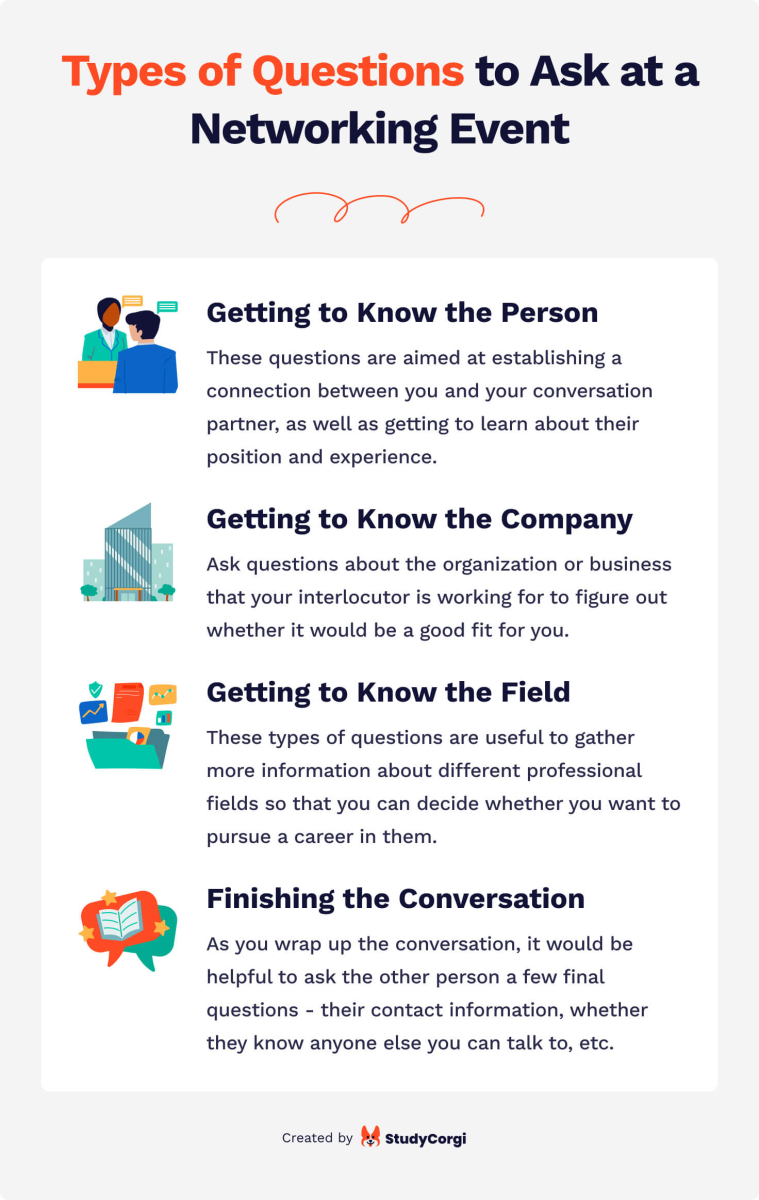
For this reason, we’ve listed a set of helpful questions you can pose during networking events. Write them down and practice them before attending the event, and we guarantee your evening will be profitable.
- What led you to pursue a career in this field?
- What are your primary job responsibilities in this position? Could you describe a typical workday in this position?
- What skills do you consider to be essential for success in this profession?
- What experience or qualifications did you need to obtain this job?
- How long have you been employed in this role? Could you tell me about your background and the experience that led you to this career?
- Which professional organizations or associations do you belong to? Do you consider them particularly important?
- What do you see as the future of this field? Are there any emerging trends you anticipate in the next few years?
- Would you still choose the same career path if you were to start over?
- What aspects of your job do you find most and least enjoyable?
- Can you discuss a significant challenge you have encountered in this position?
- Looking back, what advice would you have liked to receive when starting your career?
- What recommendations would you make for someone interested in trying this line of work, such as through an internship or volunteering opportunity?
- Could you describe the professional development opportunities in this field?
- Do you suggest researching other fields or professions before choosing this career path?
- Could you recommend someone else for me to speak with about this career? And could I tell them you referred me to contact them?
📨 Post-Event Follow-Up
The success of an event won’t matter if you don’t follow up on your conversations. The work doesn’t end after getting back home after having a great experience. Now is the time for action! The next 24 hours after a networking event is the prime time to reconnect with those you met. Here we’ll explain the actions that will help you to achieve this goal.
❌ Top 10 Networking Mistakes to Avoid
If you feel as though your networking event did not go as planned, don’t feel discouraged. A single failure is not the end and you will likely have the opportunity to try again. However, to have you better prepared, we’d like to explain some of the most common mistakes students make during networking events. Check them out to avoid looking unprofessional or confused before potential employers and peers.
To make sure your networking event is successful, make sure you avoid…
- Skipping the preparation step. One of the biggest mistakes is attending without researching the guests or the purpose of the occasion. Take the time to learn crucial information about events, attendants, and your goals.
- Not tracking new contacts. When present, write down who you talked to and about what. This way, you’ll better understand where the new contacts work and what they’re interested in. Tracking contact info is equally important.
- Forgetting to follow up on the event. There’s nothing worse than attending a great event and never reconnecting with those you met. Be sure to send a message or make a phone call to remind them about yourself.
- Losing touch with new contacts. Remember to connect with new acquaintances on a regular basis. Call them up for a cup of coffee or a happy hour to maintain the relationship and stay on their radar.
- Being too demanding. Networking is all about establishing new relationships. Don’t rush things, especially if you want sound advice or help later on. Asking for favors from the start will reflect on you poorly. The other party will believe that you’re only talking to them because you want something from them.
- Talking over everyone. Another mistake students make is not letting other people talk. This approach will quickly make others lose interest in the conversation. Learn to listen, and you might hear something valuable.
- Being too cautious. Networking may be intimidating, especially if you don’t have previous experience. However, it’s important to come up to people and introduce yourself. Take a small break if you’re too overwhelmed or tired.
- Behaving inappropriately. Remember that you’re at the event mainly for professional reasons. Mind your manners, be civil, and respect the personal space of others. Being well-behaved will do wonders for your personal and professional life.
- Staying quiet. Sometimes, attendants are reluctant to engage others in a conversation. They stay silent or answer questions in the simplest terms. To perform well, prepare several questions and answers for hypothetical conversations.
- Talking only to the big guys. Beginners often try talking to people with higher seniority and expertise than they do. However, there’s much one may learn from those of their own status. Make sure you socialize with all kinds of people at the event.
Thanks for reading our article. We wish you the best of luck in your networking journey and hope that you’ll make many meaningful connections with our advice. If our article helped you, don’t forget to share it with your friends and peers!
